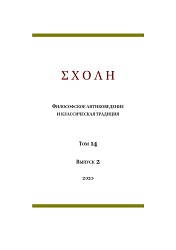«Всеобщее есть ничто, либо последующее»: вопрос о конституции и первенстве сущего как такового в перипатетической метафизике
“The universal being is either nothing or posterior”: an inquiry into the constitution and priority of being as being in Peripatetic metaphysics
Author(s): Maria VarlamovaSubject(s): Metaphysics, Ancient Philosphy, Existentialism, Ontology
Published by: Новосибирский государственный университет
Keywords: the first philosophy; being as being; universal; substance; nature; Aristotle; Alexander of Aphrodisias;
Summary/Abstract: As a subject of the first philosophy, the being as being is defined as the most universal and primary one. However, Aristotle proves in the Metaphysics that neither One nor being are substances, therefore they do not exist separately. Furthermore, in the De Anima he claims that those that are said to be universal are "either nothing or posterior", because they cannot be on its own in separation from the particular things. How, then, the universal being which can be named nothing or posterior postulated as the subject of first philosophy that is most worthy of knowing? And, on the other hand, if the being as universal is not a substance, on what ground it has it's unity? In order to answer these questions, I will consider Alexander of Aphrodisias' Commentary on Aristotle's Metaphysics and also the Quaestio I.3 and I.11 of his Quaestiones.
Journal: ΣΧΟΛΗ. Философское антиковедение и классическая традиция
- Issue Year: XIV/2020
- Issue No: 2
- Page Range: 499-516
- Page Count: 18
- Language: Russian

